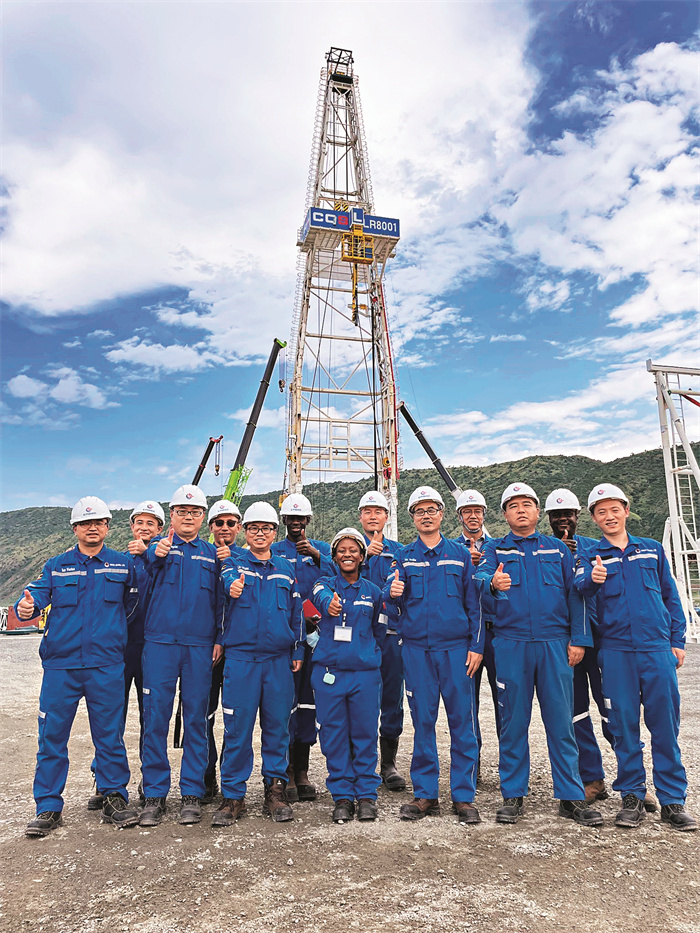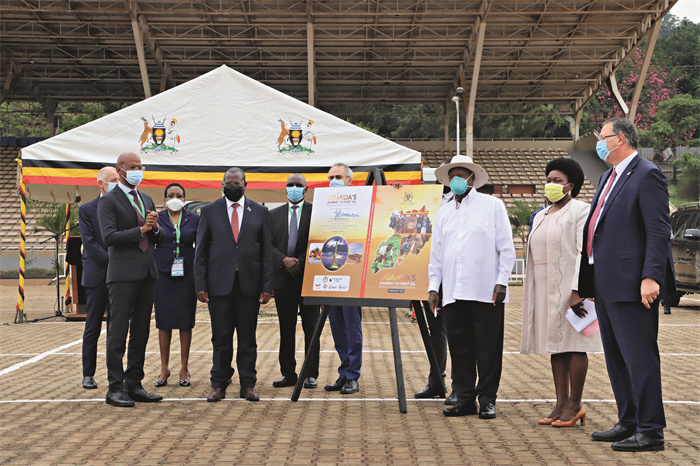|
||||||||||
| Home Nation World Business Opinion Lifestyle ChinAfrica Multimedia Columnists Documents Special Reports |
|
||||||||||
| Home Nation World Business Opinion Lifestyle ChinAfrica Multimedia Columnists Documents Special Reports |
| ChinAfrica |
| Looking Forward To Oil |
| China is playing a major role in Uganda’s oil industry development |
| Reporting from Uganda Godfrey Olukya 丨VOL. 15 January 2023 ·2023-01-12 |

CNOOC Uganda workers pose for a photo before a drilling rig at the Kingfisher Oilfield in the Lake Albert Rift Basin in west Uganda in November 2022
Although oil in Uganda was first discovered in 1925 during the colonial era, it was not until recently that its exploration and plans to exploit the black gold commercially began in earnest.
In November 2022, the country’s Minister of Energy and Mineral Development Ruth Nankabirwa Ssentamu said at a conference in Abu Dhabi, “I hope that by April 2025, we shall see the first oil.”
This has all become possible because of the country’s cooperation with the Chinese government and Chinese companies, especially oil giant China National Offshore Oil Corp. (CNOOC), an upstream company mainly engaged in oil and gas exploration and production, which handles oil exploration.
“After several explorations, commercially viable oilfields were discovered in Uganda in 2006. The country verified oil reserves of up to 6.6 billion barrels and the government looks at it as the key to facilitating national economic development,” said Matia Kasaija, Uganda’s minister of finance, planning and economic development, in a recent media interview.
Kasaija said that at that time, however, the country lacked expertise, infrastructure, and financing in oil related development and that led to delays in the creation of Uganda’s oil dream.
Long path to success
After the oil was found in 2006, Ugandan President Yoweri Museveni said the government resolved to establish a refinery near the oilfield and an oil pipeline to the neighbouring Tanzania’s seaport of Tanga, from where oil was to be exported. But the country did not have funds for the two major structures.
For some time, the government negotiated with representatives from several countries in order to get funds to construct an oil refinery and create a pipeline, but nothing much came of it.
Some foreign oil companies, including Hardman Resources, Tullow Oil and Heritage Oil had started exploring for oil and continued to do so, but had no capacity to build the refinery and pipeline.
“Those companies played a big role in discovery of many oil fields and wells; but later they sold off their shares. Hardman Resources sold its shares to Tullow Oil, while Heritage Oil sold its shares to Tullow Oil and later Tullow Oil sold all its shares to CNOOC and Total,” said Ofwono Opondo, spokesman of Ugandan government.
It was not until CNOOC Uganda Ltd., an overseas subsidiary of CNOOC, was established that efforts towards exploitation of the oil began. CNOOC entered into the Ugandan market after acquisition of one-third interest of Tullow Oil in Uganda in 2012, and bought more shares in 2018. Later, Total also acquired the remaining rights of Tullow Oil and, together with CNOOC and the Ugandan government, started working towards exploiting the oil.
Ssentamu said that after the discovery of oil, Uganda started looking for funds to construct the refinery and oil pipeline. “After delays from various companies and countries, Uganda turned to Chinese support in the bid to make its dream become true. We also decided to embrace the Belt and Road projects which enhance the economic prospects of a coalition of nations to develop infrastructure, especially roads,” she said.
Oil refinery and oil pipeline
In April 2021, the Ugandan government approved the Resettlement Action Plan for the East African Crude Oil Pipeline project. This approval paved way for the completion of the land acquisition processes in areas where the pipeline was to be constructed. Construction of the refinery subsequently kicked off.
Because of the refinery, the country’s internal infrastructure, including roads, had to be of a high standard to allow the swift transportation of construction parts and materials. In this context, China agreed to help Uganda to construct roads in the oilfield and across the country.
Construction of the refinery is being carried out by CNOOC Uganda, according to the company’s Spokesperson Amina Bukenya. “The construction of the refinery is on course. It is being constructed by CNOOC. Total is going to work on an oil pipeline although the funds to do the work were coming from China,” she told ChinAfrica.
CNOOC said in a statement it issued from Yantai Port of China on 29 July 2022 that “the most advanced Chinese oil drilling equipment in the oil and gas industry exploration and development sector, which was represented by the Drilog and Welleader System and the land rig LR8001, is being shipped to Uganda. This marks CNOOC’s great increase of technical resource investment in oilfield exploration and development in Uganda, and that a new landscape of oil and gas supply as well as social and economic development would be formed in Uganda and even East Africa.”
“Due to stability in our country, we have been able to host companies like CNOOC and Total. With support from China, CNOOC has started constructing the oil refinery,” said Ssentamu.
It is seemingly because of the good work done by CNOOC that Ssentamu said on 2 November 2022 at a conference in Abu Dhabi that the country would start commercially pumping its oil reserves in April 2025. She also said that they were considering China as a potential source of funds to develop an export pipeline running from Uganda’s oilfields to the Port of Tanga in Tanzania.

Ugandan President Yoweri Kaguta Museveni (third right) attends the ground-breaking ceremony of the Lake Albert oilfield project in Kampala, Uganda, on 1 February 2022(XINHUA)
Benefits ahead
On 11 February 2020, the Ugandan government confirmed it would borrow around $118 million from the Industrial and Commercial Bank of China to facilitate the construction of 700 km of roads across the country to accelerate the creation of its national oil industry. The roads are termed the “oil roads” by the country’s local media.
Denis Katungi, a representative for the Uganda Media Centre, stated, “Upgrading and constructing the national oil roads will facilitate the efficient development of the strategic national oil resources.”
Recently, Uganda signed a deal with China Railway Seventh Group to construct a 97-km road connecting three strategic locations around the oilfield. The creation of new roads will integrate existing cities and thus not just serve to speed up the oil industry, but also have an aggregating effect on the economy as a whole, by speeding up the scope of potential business.
Meanwhile, President Museveni told the nation that his government is working with CNOOC so that oil starts flowing in the near future. “CNOOC is constructing the oil refinery. The money we are to get from oil will not be used to buy luxuries, but will be used to develop the country’s economy,” he said.
Robert Abilu, one of the residents of Bunyoro District, where the oil fields are located, said that he is happy about CNOOC supporting the oil industry in Uganda. He said the residents were relocated from the oilfield area by CNOOC to a new village where they had good houses built for them.
“I had never dreamt of living in such a modern house. I thank CNOOC for making us live in a modern environment,” said Abilu.
|
||||||||||||
| About Us | Contact Us | Advertise with Us | Subscribe |
| Copyright Beijing Review All rights reserved 京ICP备08005356号-5 京公网安备110102005860号 |